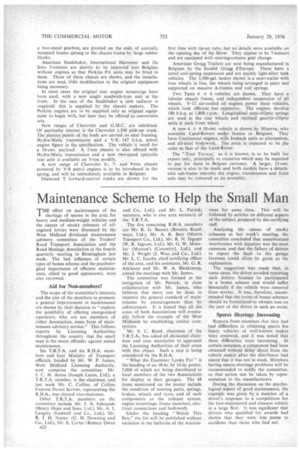Maintenance Scheme to Help the Small Man
Page 56

If you've noticed an error in this article please click here to report it so we can fix it.
THE effect on maintenance of the 1 shortage of spares in the area for heavy and medium-weight vehicles and the causes of smoky exhausts of oilengined lorries were discussed by the West Midland divisional maintenance advisory committee of the Traders' Road Transport Association and the Road Haulage Association at the fourth quarterly meeting in Birmingham last week. The bad influence of certain types of bonus scheme and the psychological importance of efficient maintenance, allied to good appearance, were also reviewed.
Aid for Non-members?
The scope of the committee's interests and the aim of the members to promote a general improvement in maintenance are shown by their decision to "explore the possibility of offering unorganized operators, who are not members of either Association, some form of maintenance advisory service." This follows reports by Licensing 'Authorities throughout the country that the small man is the worst offender against sound maintenance.
Six T.R.T.A. and six R.H.A. members and four Ministry of Transport officials, headed by Mr. W. P. James, West Midland Licensing Authority, now comprise the committee. Mr. J. C. H. Aston (Joseph Lucas, Ltd.), a T.R.T.A. member, is the chairman, and last week Mr. C. Collins, of Collins Express Parcel Service, representing the R.H.A., was elected vice-chairman.
Other T.R.T.A. members on the committee include Mr. J. A. Edmunds (Henry Hope and Sons, Ltd.), Mr. A. J. Langley (Ludwell and Co., Ltd.), Mr. R. J. H. Nurser (G. H. Downing and Co., Ltd.), Mr. E. Carter (Rubery Owen
n2.2 and Co., Ltd.), and Mr. L. Patrick, secretary. who is also area secretary of the T.R.T.A.
The five remaining R.H.A. members arc Mr. R. G. Bassett (Bassetts Roadways, Ltd.), Mr, A. R. Butt (Morris Transport Co., Ltd.), Mr. R. N. Ingram (W. R. Ingram, Ltd.), Mr. G. W. Mousley (Morton's [Coventry], Ltd.), and Mr. J. Wright (J. Wise and Co., Ltd.). Mr. L. C. Jacobs, chief certifying officer of the area, and his assistants, Mr. G. R. Atkinson and Mr. W. A. Blenkinsop, attend the meetings with Mr. James.
The committee was formed at the instigation of Mr. Patrick, in close collaboration with Mr. James, who believes that more can be done to improve the general standard of maintenance by encouragement than by enforcement. It is hoped that all the areas of both Associations will eventually follow the example of the West . Midlands by establishing similar committees.
Mr. S. C. Bond, chairman of the T.R.T.A., has asked all divisional chairmen and area secretaries to approach the Licensing Authorities of their areas with this object. Such a step is being considered by the R.H.A.
. "What the Examiner Looks For" is the heading of an 18-in. by 16-in. poster, 5,000 of which are being distributed to local members of the two Associations for display in their garages. The 48 items mentioned on the poster include the condition of steering parts, springs, brakes, wheels and tyres, and of such components as the exhaust system, engine mountings, frame members, electrical connections and bodywork.
Under the heading "Watch This Box," *list will he published without variation in the bulletins of the Associa tions for some time. This will be followed by articles on different aspects of the subject, prepared by the certifying staff.
Analysing the causes of smoky exhausts at last week's meeting, the committee concluded that unauthorized interference with injectors was the most common, and that the failure of drivers to report the fault to the garage foreman could often be given as the explanation.
The suggestion was made that, in some cases, the driver avoided reporting such defects because he participated in a bonus scheme and would suffer financially if the vehicle were removed from service. It was, therefore, recommended that the terms of bonus schemes should be formulated.to obviate loss on the part of the driver in such an event.
Spares Shortage Increasing
Reports from members that they had had difficulties in obtaining spares foe heavy vehicles of • well-known makes were reviewed, and it was noted that these difficulties were increasing. In certain instances, a component had been obtained without delay direct from the vehicle maker after the distributor had stated that it was not in stock. Members having spares-shortage problems will be recommended to notify the committee, so that action can be taken by repre; sentation to the manufacturers.
During the discussion on the psychological aspect of good maintenance, the example was given by a member of a driver's response to a competition for the best-maintained and cleanest vehicle in a large fleet. It was significant that drivers who qualified for awards had shown that they were less prone to accidents than those who had not.




































































































